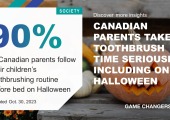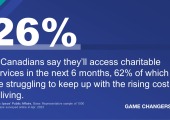Canadian Kids Aged 8 to 11 rate Animals Becoming Extinct as Environmental Issue that's Most Important to Them
Kids in Earth Rangers Program Demonstrate Greater Concern for Environment, Take Action to Preserve and Protect Environment
Toronto, ON - Canadian kids aged 8 to 11 rate `animals becoming extinct' as the environmental issue that is most important to them, according to a new Ipsos poll conducted on behalf of Earth Rangers. Specifically, 69% of kids surveyed rated `animals becoming extinct' as being `very important' to them, placing it ahead of other issues such as litter (63%), air pollution (61%), water pollution (61%), forests being cut down (56%), animal habitat loss (56%), wasting energy (49%), climate change (39%), pesticides (22%) and overfishing (21%). Interestingly, those kids involved in the Earth Rangers program were more likely to state that each issue was very important to them.
Children today appear to be in tune with most environmental challenges facing the world. When prompted with a list of various environmental issues, awareness of litter (83%), animals becoming extinct (81%), air pollution (76%), wasting energy (74%), water pollution (74%) and forests being cut down (72%) was the highest. But most were aware of animal habitat loss (64%), and climate change (60%) as well, while fewer were aware of pesticides (37%) or overfishing (33%). Just 1% of kids surveyed were not aware of any of these things.
Canada's children are not at all on the fence about the importance of acting to protect the environment. In fact, 85% of those surveyed said it was `very important' to do things to protect the environment, compared to 14% who said it was `kind of important, but not a lot', and 1% who didn't know. Earth Rangers members were more likely (91%) than those who aren't in the program (78%) to say it is very important.
In terms of what those activities might be, once again Earth Rangers children are more likely to have taken all sorts of action to protect the environment, although most Canadian children appear to be making good strides to do their part in various ways:
- Used a reusable bottle instead of a plastic water bottle (86% total - 90% ER members vs. 81% non-members)
- Turned lights off in their home when they are not being used (85% total - 86% ER members vs. 84% non-members)
- Saved water by not running the tap too long while brushing your teeth, washing your hands, or having a bath/shower: 77% total - 85% ER members vs. 70% non-members)
- Picked up litter outside (75% total - 83% ER members vs. 66% non-members)
- Took part in Earth Hour (51% total - 60% ER members vs. 43% non-members)
- Recycled batteries (50% total - 60% ER members vs. 39% non-members)
- Put up a bird feeder (42% total - 55% ER Members vs. 29% non-members)
- Planted a tree (38% total - 48% ER members vs. 29% non-members)
- Rode your bike to school instead of taking the bus or driving (33% total - 39% ER members vs. 26% non-members)
- Removed an invasive species (8% total - -11% ER members vs. 6% non-members)
- Just 1% have not any of these things - all non ER members.
Moreover, the data reveal that 69% of Canadians `agree' (34% a lot/35% a little) that they are `actively involved in helping save animals and their habitats', with Earth Rangers members being twice as likely (92%) as non-members (46%) to agree that they're involved in this type of activity.
With many Canadian children taking steps to protect the environment, it's perhaps not surprising that 96% `agree' (70% a lot/26% a little) that `kids can make a positive difference to the health of our planet', while just % `disagree a little' and 1% don't know.
One of those positive differences is the influence that these children can have on others, including their parents. In fact, 84% of children surveyed believe that their parents have done things to protect the environment as a result of their children's activities.
There appears to be a link between a desire to protect the environment and attitudes towards other social causes as demonstrated through Earth Rangers membership. While most kids say it's `very important' to protect animals from extinction (94% ER members vs. 72% non-members) and that recycling is `very important (89% ER members vs. 79% non-members), ER members are also more likely to say a wide variety of social causes are `very important', including: saving water and energy (86% ER members vs. 75% non-members), raising money for good causes (79% ER members vs. 52% non-members), helping homeless people (79% ER members vs. 53% non-members), collecting food for food banks (77% ER members vs. 59% non-members), building schools in underdeveloped countries (67% ER members vs. 42% non-members), and volunteering (56% ER members vs. 38% non-members).
These are some of the findings of an Ipsos poll conducted between January 13 to February 2, 2015 on behalf of Earth Rangers. For this survey, a sample of 1,200 English Canadian kids aged 8 to 11 was interviewed online: 601 were interviewed via the Ipsos I-Say panel, while 599 were interviewed online with sample provided by Earth Rangers. The precision of Ipsos online polls is measured using a credibility interval. In this case, the poll is accurate to within +/ - 4 percentage points, 19 times out of 20, of what the results would have been had all English Canadian kids aged 8 to 11 been polled. The credibility interval will be wider among subsets of the population. All sample surveys and polls may be subject to other sources of error, including, but not limited to coverage error, and measurement error.
For more information on this news release, please contact:
Sean Simpson
Vice President
Ipsos Public Affairs
(416) 572-4474
[email protected]
About Ipsos
Ipsos is an independent market research company controlled and managed by research professionals. Founded in France in 1975, Ipsos has grown into a worldwide research group with a strong presence in all key markets. Ipsos ranks third in the global research industry.
Ipsos has been listed on the Paris Stock Exchange since 1999 and generated global revenues of e1,669.5 ($2,218.4 million) in 2014.
With offices in 87 countries, Ipsos delivers insightful expertise across five research specializations: brand, advertising and media, customer loyalty, marketing, public affairs research, and survey management.
Ipsos researchers assess market potential and interpret market trends. They develop and build brands. They help clients build long-term relationships with their customers. They test advertising and study audience responses to various media and they measure public opinion around the globe.
Visit www.ipsos.com to learn more about Ipsos' offerings and capabilities.
More insights about Consumer Goods


![[WEBINAR] KEYS: Global Trends - The Uneasy Decade](/sites/default/files/styles/related_more_insights/public/ct/event/2025-09/thumbnail-templates_0.png?itok=Qh37M2xL)
![[WEBINAR] Canadian EV Adoption Trends in 2025](/sites/default/files/styles/related_more_insights/public/ct/event/2025-01/thumb.png?itok=RSGzZvMm)
![[WEBINAR] Sustainable Packaging: A Potential Avenue of Distinction](/sites/default/files/styles/related_more_insights/public/ct/event/2023-09/SustainablePackaging_WebR_feature%20copy.jpg?itok=X0DpNf_C)